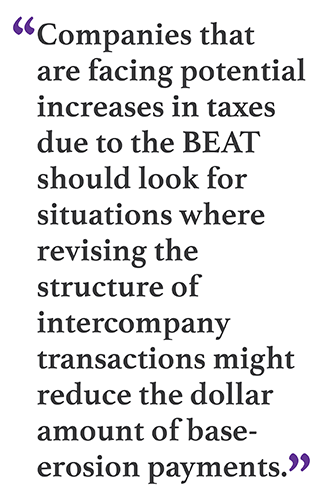
The base erosion and anti-abuse tax known by the acronym "BEAT" was enacted by the Tax Cuts and Jobs Act (TCJA) as a means of limiting intercompany funds flowing out of the United States. For companies that meet certain criteria, the BEAT acts as an alternative minimum tax, with the potential for the additional tax payable to be significant. As such, the BEAT continues to be a significant area of focus for multinationals with U.S. operations, particularly large multinationals with material U.S.-outbound intercompany flows.
Effective management of BEAT exposures is highly specific to the facts and circumstances of each multinational and requires those impacted to perform critical reviews of operations and supporting structures that result in material funds flows. Many intercompany flows that touch the corporate treasury group appear relevant; these could include interest on loans, lease-financing payments, guarantee fees, and service payments to non-U.S. treasury centers.
Therefore, treasury professionals must coordinate with their colleagues in tax and other areas of the company to manage the impact of intercompany financial flows on any new, and potentially substantial, tax liabilities under the BEAT provision.
Understanding the BEAT Provision
On December 2, 2019, the IRS and the U.S. Department of the Treasury issued final regulations implementing the BEAT.
As context, the BEAT was designed to prevent companies from reducing their U.S. income tax liabilities through so-called "base-erosion payments" to foreign related entities. Specifically, the BEAT works by effectively charging a multinational the greater of either its U.S. income tax bill if calculated normally—i.e., with intercompany payments treated as deductible and using the corporate tax rate—or a BEAT-adjusted income tax bill, wherein certain intercompany payments are added back to taxable income but multiplied by a comparatively lower BEAT rate. (The BEAT rate was 5 percent for 2018 but increased to 10 percent for 2019 through 2025, and will increase again to 12.5 percent starting in 2026. As such, the BEAT is going to become even more impactful in the future.)
Intercompany payments from U.S.-based entities to foreign entities that are subject to the BEAT include royalties, services fees, interest charges, and other deductible payments (e.g., depreciation associated with acquired assets). However, some payments, such as those that are classified as cost of goods sold (e.g., the intercompany purchase of inventory), are not included.
For payment types within the scope of the BEAT, exceptions are few and far between. The BEAT applies regardless of whether payments reflect market prices for the underlying transactions or whether the multinational would have had to otherwise engage a third party to perform the same functions or services.
Identifying Companies Subject to the BEAT Provision
In order for the BEAT to apply, a U.S. corporate taxpayer must meet two criteria. First, its annual gross receipts for the three-year period ending with the preceding taxable year must average more than $500 million. And second, its deductions for base-erosion payments must exceed 3 percent of total allowable deductions (2 percent for companies that are banks or registered securities dealers).
These thresholds cast a wide net. The IRS and U.S. Treasury Department anticipate that the BEAT will impact 103,500 to 114,500 U.S. corporate taxpayers.1
Some companies' supply-chain structures make them more likely than others to have material intercompany payment flows leaving the United States. In our experience, the following situations tend to result in material outbound payments:
- Companies where U.S. entities rely on foreign related parties for financing—e.g., a foreign parent borrows from a third-party bank, then lends to its U.S. subsidiary
- Foreign-headquartered companies with shared service centers based outside the United States, resulting in U.S.-outbound services payments—e.g., a U.S. subsidiary pays a service fee to the foreign parent for management services including treasury services
- U.S.-headquartered companies whose non-U.S. subsidiaries are compensated on a cost-plus basis for functions they perform, such as sales support
- Companies in intellectual property (IP)–intensive industries with offshore IP holding companies, which are likely to result in outbound royalty payments from U.S. entities to the IP holding companies
Any companies with these characteristics—or another organizational structure that results in U.S. entities making material outbound payments to their foreign counterparts—are more likely to be subject to the BEAT. It would make sense for treasury teams to evaluate whether they can reduce cross-border payments to related parties for treasury-related activities, including intercompany interest payments, guarantee fees, and fees for treasury services performed. This is especially true if the company's level of revenues or deductions means it is in danger of crossing the thresholds that would subject it to the BEAT.
Key Considerations
The Treasury Department and the IRS anticipate that multinationals are likely to make changes to their intercompany payment flows to avoid the BEAT. The preamble to the final BEAT regulations states that they "recognize that in response to these final regulations … business[es] may alter the way they transact with related versus unrelated parties. They may make changes to financial arrangements, supply-chain arrangements, or the locations of business activity."
 Which changes an organization will make will be very taxpayer-specific and highly dependent on the applicable facts and circumstances. Many multinationals will probably work to limit their exposures to the BEAT by managing the numerator in the 3 percent threshold (2 percent for financial firms) through optimization of their intercompany payment structures.
Which changes an organization will make will be very taxpayer-specific and highly dependent on the applicable facts and circumstances. Many multinationals will probably work to limit their exposures to the BEAT by managing the numerator in the 3 percent threshold (2 percent for financial firms) through optimization of their intercompany payment structures.
Within affected corporations, the tax teams have naturally assumed the primary responsibility for digesting the BEAT rules and for determining their companies' BEAT positions and (where applicable) BEAT liabilities. However, these determinations are inextricably linked to intercompany payments managed by the corporate treasury function—particularly when such payments arise in the context of intercompany debt transactions; centralized procurement or "clearing house" structures, as they relate to cash management responsibilities; and intercompany treasury services.
Intercompany debt. Interest payments from U.S. companies to foreign related parties are base-erosion payments. For companies that are above the BEAT thresholds/triggers, issuing new cross-border intercompany debt to a U.S. borrower could result in additional tax payments. For companies that are above the BEAT revenue threshold but below the deductions trigger, a new issuance could, in theory, push the organization over the "BEAT cliff"—such that the company might suddenly owe BEAT not just on the interest for that particular debt payment, but on all relevant intercompany royalties, service fees, and interest payments.
Depending on company-specific facts and circumstances, an organization in this situation might want to consider the following actions:
- Seeking relatively lower interest rates for intercompany loans where the U.S. entity is the borrower—for example, by applying the safe harbor rate from a U.S. transfer pricing perspective (i.e., the applicable federal rate—AFR) or by including features, such as senior status, that reduce the risk of the instrument and therefore reduce the arm's-length borrowing rate.
- Reassessing existing intercompany loans to determine whether they could be restructured or refinanced to reduce the size of their interest payments, given the current rate environment.
- Borrowing directly from a third-party bank, instead of taking an intercompany loan. Interest paid by the U.S. entity to an external financial institution is not a payment to a related party and so is not subject to the BEAT, although a guarantee fee paid to a related-party guarantor does fall within the scope of the BEAT.
- Opting to utilize third-party debt without a related-party guarantor, even at a relatively higher interest rate, if the benefits of reducing outbound related-party transactions (through elimination of the guarantee fee) outweigh potentially higher interest rates.
- Restructuring financing arrangements that are pass-through structures—for example, where the U.S. entity borrows from a non-U.S. entity with the intention of on-lending to other related parties. In this case, a wiser approach might be to route instruments more directly, in a manner that avoids the U.S. entity as an intermediary and thus reduces deductions subject to the BEAT.
It is important to note that the final BEAT regulations do not allow for netting of intercompany inflows and outflows in cases where the U.S. business makes payments to and receives payments from the same foreign related party. This means that a U.S. entity would not be able to net intercompany interest paid and earned to reduce the value of its base-erosion payments.
Centralized procurement and clearing house functions. Companies that centralize third-party payments or intercompany payments through procurement centers or designated clearing houses are more likely to have intercompany payments that would fall under the BEAT umbrella. That's because these structures increase the likelihood of intercompany funds flows from U.S. companies to their foreign related parties. The same is true for companies that employ arrangements where revenue or income is divided among U.S. and non-U.S. entities that contribute to the generation of those revenues or income.
As a result, we are seeing many companies take steps to identify the specific scenarios within these structures that are generating U.S. outflows to foreign related parties, and to eliminate or minimize those outflows. That said, companies often implement centralized procurement, clearing house, and other similar structures in order to promote efficiency from a cash management perspective—to standardize the interface for processing third-party payments, to streamline transaction flows, to more easily track payments, etc. Therefore, corporate tax and treasury teams need to work together, to jointly consider the impact of any potential changes and to ensure that such changes result in the optimal alignment of organizational objectives.
Intercompany treasury services. To the extent that a multinational has centralized treasury functions outside the United States, the U.S. entity likely makes outbound payments to the related party as compensation for those services. In some cases, treasury services may have historically been grouped with other services (e.g., administrative/back-office activities, management services) and compensated for collectively via a single service fee (e.g., at cost-plus). Intercompany payments under such a structure would be subject to the BEAT.
Multinationals with this type of structure might consider "unbundling," or bifurcating, the related charges, separating those that are excepted from the BEAT from those that are not. Which services are excepted? Under the BEAT, an exception applies for services that are charged at cost—without a markup—under an elective U.S. transfer pricing methodology called the services cost method (SCM).2 If a company were to separate out services that qualify for the exception from those that do not, the net effect would be a reduction in the value of foreign related payments subject to the BEAT, without materially overhauling intercompany transaction flows.
Specific evaluations with respect to treasury services require the team to differentiate among functions that are routine, administrative, or coordinating in nature—and may be SCM-eligible—versus those that are more value-added, such as financial risk management activities. Note that functions related to the actual financing of a transaction are explicitly excluded from SCM exception.
The new OECD Guidance on Financial Transactions provides insights on how to analyze the functions of a treasury entity beyond the broad bucket of "treasury services." It may provide additional assistance with "unbundling" treasury services. From there, the company can make a determination as to whether each subset of services is eligible for the SCM.
Get a Feel for the BEAT
The final BEAT regulations provide guidance and rules governing the implementation of the BEAT, against which companies can evaluate strategies to manage, or potentially avoid, additional federal income tax due to the BEAT. Companies that are facing potential increases in taxes due to the BEAT should consider whether there are steps they may take to reduce their base-erosion payments. More specifically, they should look for situations where revising the structure of certain intercompany transactions might reduce the dollar amount of base-erosion payments made by U.S. legal entities.
This might be especially relevant for treasury-related functions, as there could be opportunities for material reductions in U.S. outbound payments without the need for significant operational restructuring.
1. Note that the BEAT does not apply to regulated investment companies, real estate investment trusts (REITs), or S-corporations.
2. SCM-eligible services may include those explicitly listed by the IRS in Rev Proc. 2007-13 or those where a selection of independent companies providing these services at arm's length earn a median return of less than 7 percent.
 Stefanie Perrella is a managing director in Duff & Phelps' transfer pricing practice based in New York.
Stefanie Perrella is a managing director in Duff & Phelps' transfer pricing practice based in New York.
 Zachary Held is a director in Duff & Phelps' transfer pricing practice based in New York.
Zachary Held is a director in Duff & Phelps' transfer pricing practice based in New York.
 Elizabeth Patrun is a director in Duff & Phelps' transfer pricing practice based in Chicago.
Elizabeth Patrun is a director in Duff & Phelps' transfer pricing practice based in Chicago.
© 2025 ALM Global, LLC, All Rights Reserved. Request academic re-use from www.copyright.com. All other uses, submit a request to [email protected]. For more information visit Asset & Logo Licensing.




